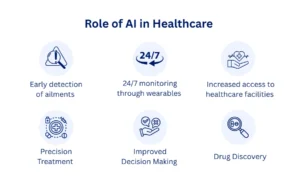Artificial intelligence is rapidly making its place in every industry worldwide. The benefits of using AI in workflow include speed, efficiency, innovation, and accuracy. An industry that is reluctant to upgrade technologically is healthcare, as human ethics and empathy are central to this field. However, artificial intelligence technology has made its place in the healthcare industry as well. Artificial intelligence in healthcare is a blessing for healthcare professionals and their patients. In this blog, we shall discover the applications, benefits, and challenges of AI implementation in the healthcare industry.
What is Artificial Intelligence
Artificial intelligence is a field of technology that uses data for training and performs tasks that previously required human intelligence. AI leverages several other technologies like machine learning solutions, neural networks, and natural language processing to perform these tasks. Artificial intelligence is becoming stronger by the day with the introduction of more and more improved AI technologies. Some of the popular AI technologies are Generative AI, Predictive AI, Machine learning, and advanced data analytics. It is an entire universe of AI-powered tools and technologies that can be used in our workplace or day-to-day life. The global market size of AI in healthcare is expected to reach $170 billion by 2030. Artificial intelligence in healthcare offers diagnostic solutions, treatment plans, drug discovery, and automation of administrative tasks.
Use Cases of Artificial Intelligence in Healthcare
The role of AI in healthcare has a wide landscape. From automation to innovation, AI in healthcare is a smart support system that helps human professionals focus on patient care more efficiently. Let us see some of the applications of AI in healthcare to understand it better.
-
Improved Diagnostics
AI tools can be trained to detect diseases based on patients’ signs and symptoms. AI-powered tools are now utilized in diagnosing cancers, identifying anomalies in scans, referring to medical literature, and offering help in treatment decisions.
-
Personalized Treatment
One of the most interesting use cases of AI in healthcare is personalization. A personalized treatment plan that considers patients’ medical condition, as well as their history of treatment, to create a plan that works best for patients. Personalized treatments being created as per your health requirements are more likely to give better results than generic treatment plans.
-
Drug Discovery
AI is excelling at the drug discovery process by going through large datasets and detecting potential drug candidates. It can analyze their effectiveness and assess any potential side effects proactively. It studies the molecular structure of diseased cells and drug resources to gauge the effectiveness of the medicine.
-
Robotics and Automation
Robotic Process Automation (RPA) and actual physical bots are being used in surgeries, rehabilitation, and patient care. Thus, freeing up humans to perform other strategic and complex tasks while ensuring efficiency and accuracy of its functions.
-
Virtual Assistants and Patient Support
It is difficult for healthcare professionals and hospital staff to be available for patient support 24/7. AI powered virtual assistants and chatbots stay active 24/7 and provide active assistance to patients. This not only increases patient engagement but also lets patients understand if it’s an emergency or not.
-
Administrative Efficiency
Artificial intelligence in healthcare has been mostly found useful in routine task automation and streamlining processes. From data entry to medical claims, and other document-based tasks can be handed over to AI tools for efficient and accurate execution.
-
Early Detection and Prevention
AI tools can be trained on historical data or genetic data to detect any early signs of upcoming diseases. Predictive analytics comes in handy during such an investigation. This has been proven in the case of breast cancer, where AI’s analysis of mammary glands revealed the probability of breast cancer with more accuracy than a human radiologist.

Benefits of AI in Healthcare
-
Risk Assessment
AI-powered predictive analytics in healthcare can analyze global data to forecast the outbreak of diseases. It can also detect diseases and disorders in their early stages, even without evident signs of them. This can help assess upcoming risks and take a proactive approach towards addressing the issue.
-
Preventive Care
Diagnostic tests provide more accurate and quicker results with AI-powered tools. Thus, providing preventive care opportunities before the disease is diagnosed. It can also be used as a healthcare wearable device for diabetic patients, to keep their lifestyle healthy with regular reminders and checkups. Fitness bands are an example, but AI-powered smart devices can also be connected to hospital staff so patients can be monitored thoroughly.
-
Increased Efficiency
Artificial intelligence in healthcare industry automates routine tasks like patient notes, regular forms, medical claims, etc. This frees up healthcare professionals and assistants to focus more on patient care rather than such tedious tasks.
-
Increased Accuracy
AI in healthcare is most popular because of its accuracy. The importance of accuracy in the healthcare field is immense. Accurate diagnosis or accurate drug doses can impact someone’s life significantly. Artificial intelligence technology being trained on quality data will result in more accurate outcomes and provide impactful outputs.
-
More Accessibility
By enabling virtual consulting and checkups through AI-powered healthcare applications, healthcare professionals can now provide their expertise to rural areas that don’t have healthcare access easily. This is also a social benefit of AI as it improves healthcare access in remote areas.
-
Real-time Patient Care
Through AI-powered applications and wearable devices, hospitals and doctors can stay up to date with real-time information about their patients. This allows them to monitor their health better and provide virtual solutions in case needed.
-
Enhanced Communication
Many healthcare professionals do not get enough time to discuss their findings or stay connected due to their busy schedules. Artificial intelligence can help keep different health professionals connected through a common medium. This not only enables a collaborative treatment approach but also keeps the healthcare community informed of the regions’ health conditions.
Challenges of Implementing AI in Healthcare
The major challenges regarding the use of artificial intelligence in healthcare are
-
Data Quality and Biases
The performance of any AI platform or tool depends on its training data. The quality of training data needs to be diverse and unbiased to avoid any kind of bias in results. This is a crucial requirement because biases in healthcare can further deteriorate the condition of healthcare.
-
Ethical Concerns
The issues regarding data privacy, algorithmic bias, and the fear among individuals about AI taking over need to be addressed before AI adoption. If challenges are addressed early, the later process of AI-powered operations becomes smooth.
-
Integration with legacy systems
It needs expert AI service providers or careful planning to integrate AI with legacy systems. A smooth integration requires strategic planning and user involvement to build a tailored AI tool that suits your specific requirements.
-
Regulation and Supervision
Proper regulatory structure is essential to maintain a responsible and effective use of AI-powered healthcare technologies. Apart from this, a responsible human supervisor must keep an eye on AI activity to ensure appropriate behavior.
Conclusion
Artificial intelligence is the foundation of the futuristic world we will soon be inhabiting. With AI in healthcare, our access to medical consultations and treatments is certainly going to increase. Personalized treatment plans and preventive measures will boost healthy life globally. If you are into healthcare, you can build a custom AI tool for your organization with the help of AnavClouds Analytics.ai, a trustworthy AI development company. With us, you can make your business future-ready and more profitable. Our expert AI development services are going to place you ahead of your competitors effortlessly. Book a demo with us today and understand the scope of artificial intelligence in healthcare in detail.
FAQs
How is AI being used in healthcare?
Currently, AI is being used for diagnosis assistance, drug discovery, personalized treatment, and administrative tasks.
What is a key benefit of using AI in healthcare?
Artificial intelligence in healthcare helps professionals determine how to improve and manage disease treatments. Many organizations are leveraging AI to help improve drug safety.
What is the future of AI in healthcare?
The future of AI in healthcare is characterized by more healthcare automation and the development of new methods that are more functional, scalable, and productive.
When was AI first used in healthcare?
Surprisingly, AI was first used in the healthcare sector back in the 1970s. AI initially focused on data digitization and building a foundation for future technological advancements.
What is one real-world application of AI in healthcare?
One of the most essential use cases of AI in healthcare is precision medicine. It aims to optimize the journey of diagnosis, therapeutic intervention, and prognosis.



